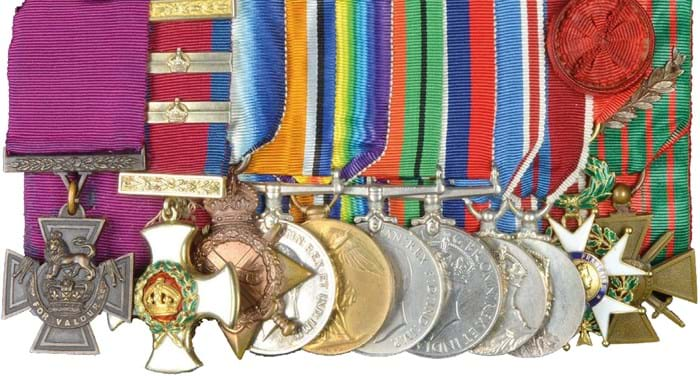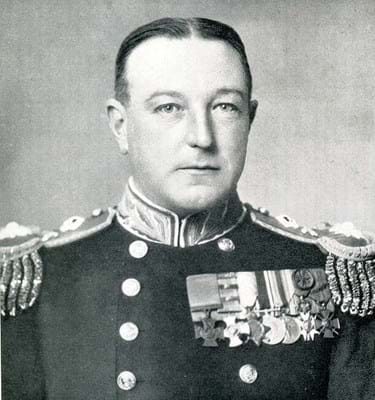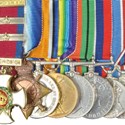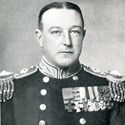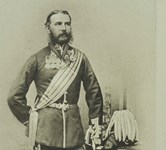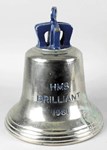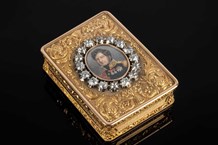Although Lord Ashcroft’s agent was in the running for the superb VC group won by Vice-Admiral Gordon Campbell for First World War heroics fighting a U-boat, he was not even the underbidder as the £700,000 hammer price (£840,000 with premium) set a new high.
“It was a quite extraordinary result,” James Morton of Morton & Eden told ATG after the November 23 auction. “We were quietly hoping it might make a record for a VC in this country, which we ourselves hold. But I never imagined it would make double that.”
The U-boat peril
Amid such landmarks as mass slaughter of the Somme and the heroics of ‘The Few’ in the Battle of Britain, it is sometimes forgotten how huge the threat of the U-boat was to Britain’s survival in both world wars. In his memoirs, Winston Churchill admitted in 1949: “The only thing that ever really frightened me during the war was the U-boat peril.”
Desperate times, sparked by these new weapons of war ripping into the British merchant trade, called for a range of new counter-measures. One of these was the Q-ship: decoy vessels disguised as merchant ships that could lure in U-boats to within range of concealed guns.
Campbell earned the VC as a captain of Q-ship Q-5, HMS Farnborough. On February 17, 1917, he allowed his ship to be torpedoed by German submarine U83. Having then drawn in the submarine through the ruse of a ‘panic party’ as she slowly sank, after half an hour the guns of Q-5 finally opened fire at close quarters and sank the enemy vessel in what may be regarded as a supreme test of naval discipline.
Campbell later declined the potential award of a bar to his VC (following nomination by his fellow officers). While captain of HMS Pargust, he successfully deployed the same tactics and sunk UC29 on June 7, 1917.
A DSO and two bars included in this group also resulted from his sterling anti-submarine work. In the action for the second bar, on August 8, 1917, a battle with a U-boat lasting over three hours resulted in Campbell’s ship Dunraven being torpedoed and eventually sunk. However, all hands were saved by another British vessel.
As Morton concluded, Campbell’s VC was “absolutely outstanding” and all three DSOs “were also extraordinary”.
In recognition of his valour, Campbell led the guard of honour of 100 VC winners at the burial of the unknown warrior at Westminster Abbey on November 11, 1920.
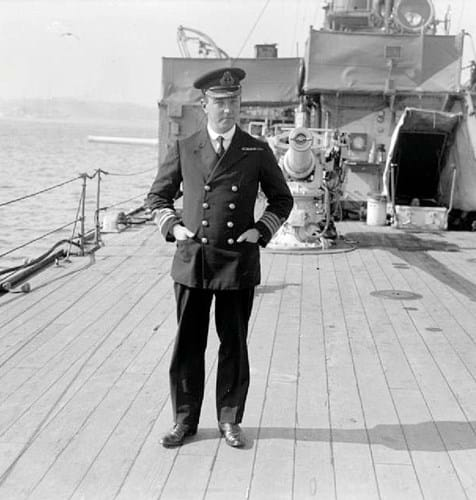
Vice-Admiral Gordon Campbell, whose First World War Victoria Cross medal group sold for a record £700,000 at Morton & Eden.
Family connection
The winning phone bidder was Baron Lorne Thyssen-Bornemisza, who is actually Campbell’s great-nephew (his maternal great-grandfather was Sir Edward Tapsell-Campbell, brother of Gordon Campbell). “These medals have enormous historic value for the UK, as well as personal value to me and my family,” he said.
“Behind every medal is a human story, and an example to generations to come. Gordon Campbell was an old-fashioned hero who was recognised for conspicuous gallantry, consummate coolness and skill in his command of Q-ships.”
Lorne Thyssen-Bornemisza added that he is offering the medals for display in a UK museum, where he hopes “as many people as possible will have the opportunity to learn about Gordon and his incredible story”.
The previous UK auction record for a VC was set at Morton & Eden in July 2014: the £340,000 bid for the medal awarded to Lt John Duncan Grant in 1905 for the British campaign in Tibet. That one is now on view in the Lord Ashcroft Gallery at the Imperial War Museum.
The previous world auction record for a VC at auction was achieved in Australia in July 2011, when a VC sold for the then equivalent of £678,000 (Aus$1m hammer).
Strong competition
Morton, who had guided the Campbell group at £300,000-400,000, was “very pleased that people turned out for it and that the underbidder gave it a very good shot”.
He noted that many before the auction had predicted the buyer was “bound to be Ashcroft, as he always buys everything. But of course that isn’t the case. Ashcroft has limits just like everybody else. So it is very good for the market that somebody else is buying.”
Campbell’s group of 11 medals overall was consigned by The Fellowship of St John (UK) Trust Association, an Anglican charity working in education and mission, for which the proceeds will aid its work.
Until recently Campbell’s VC had been on loan to his old school, Dulwich College. Coincidentally his nephew Lorne MacLaine Campbell, another alumnus of the college, was also awarded the VC.


